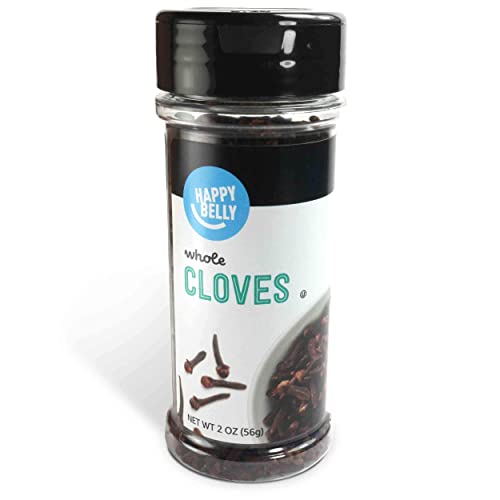Key Takeaways:
- Clove, enriched with eugenol, offers a spectrum of health benefits, from antimicrobial to anti-inflammatory actions.
- Eugenol, the dominant component of clove oil, is a natural protector against microbes and a contributor to clove’s distinctive scent.
- Incorporating clove into your diet can support oral hygiene, and digestive health, and may have mood-lifting effects.
- Clove has been a natural analgesic for dental pain and has traditional applications in managing indigestion and depression.
- While cloves are safe in culinary quantities, moderation is crucial to avoid potential side effects.

Background
Clove, the aromatic spice that has graced both kitchens and traditional medicine cabinets for centuries, is a small yet mighty boon to health. Its secret weapon, eugenol, is a versatile compound that has captured the interest of both ancient healers and modern scientists. This section will delve into the myriad of ways clove and eugenol contribute to health and wellness, backed by historical use and contemporary research.
The Science of Eugenol
Eugenol’s role in clove’s efficacy is multifaceted. As a phytochemical, it has been observed to have antioxidant properties, which contribute to its potential in combating oxidative stress and supporting cellular health. This section will explore the scientific underpinnings of eugenol’s health benefits and its applications in modern medicine.
Clove in Traditional and Modern Medicine
From Ayurveda to Chinese medicine, clove has been a staple. This section will compare traditional uses with current research findings, providing a comprehensive view of clove’s therapeutic journey through the ages.
Culinary Uses and Health
Clove isn’t just for medicine; it’s a culinary star. Here, we’ll provide tips on how to integrate clove into your diet for both flavor and health, including recipes and usage tips for maximizing its benefits.
Safety and Dosage Guidelines
Understanding the safe use of clove and eugenol is crucial. This section will outline recommended dosages, potential interactions with medications, and guidelines for different forms of clove, including whole cloves, ground spice, and essential oil.
Research and Future Directions
What does the future hold for clove research? We’ll discuss ongoing studies, potential new health applications, and the direction of scientific inquiry into this powerful spice.
What to do next?
Ready to harness the health benefits of clove? Start by adding this spice to your pantry and incorporating it into your meals. For those interested in its essential oil, consult a healthcare provider for guidance on safe and effective use.
Conclusion
Clove, with its rich history and promising health benefits, stands out as a natural remedy worth considering. By understanding its uses, benefits, and safety, we can appreciate clove not just as a culinary ingredient but as a contributor to a holistic health approach.
FAQs on Clove and Eugenol
Q: What are the best ways to use clove for health?
A: Clove can be used in cooking, as a tea, or in oil form for topical applications. For oral health, chewing on a clove or using clove oil diluted in a carrier oil for oil pulling can be beneficial.
Q: Can clove interact with medications?
A: Clove may interact with certain medications, such as blood thinners or drugs metabolized by the liver. Always consult with a healthcare provider before adding clove to your regimen if you are on medication.
Q: How does clove oil help with dental pain?
A: Clove oil contains eugenol, which has analgesic properties that can help numb dental pain. It should be used sparingly and diluted when applied to the gums or teeth.
Q: Is there a difference between consuming whole clove and clove oil?
A: Yes, whole cloves are generally safe to consume in food, while clove oil is much more concentrated and should be used with caution, following safety guidelines for dosage.
Q: Can eugenol from clove be used as an antidepressant?
A: While eugenol has MAO-inhibiting properties, which may have mood-lifting effects, it should not be used as a standalone treatment for depression. Professional medical advice is essential.
Q: Are there any environmental concerns associated with cultivating clove?
A: Sustainable farming practices are important for all crops, including clove. Look for cloves that are ethically sourced and consider the environmental policies of the regions where they are grown.
Q: How can I incorporate clove into my skincare routine?
A: Clove oil, diluted with a carrier oil, can be used for its antimicrobial properties in skincare. However, it’s potent and may irritate sensitive skin, so it’s important to do a patch test first.
Q: What should I do if I experience side effects from clove?
A: If you experience adverse reactions from clove, discontinue use immediately and consult a healthcare provider, especially if symptoms are severe or persistent.

Shahane Tan
Shahane Tan, a Nursing graduate from Xavier University, combines healthcare expertise with roles in real estate and life coaching. Passionate about holistic well-being, her insights bridge science and practicality. Explore her balanced wellness approach at JustFlourishing.com.







Leave a Reply